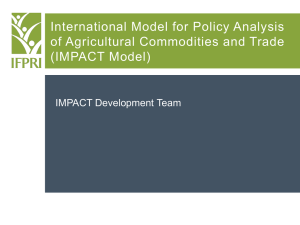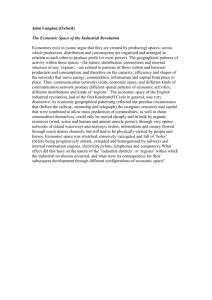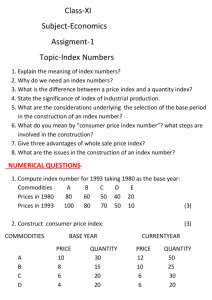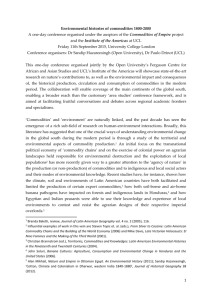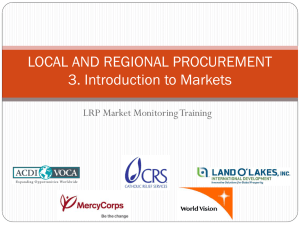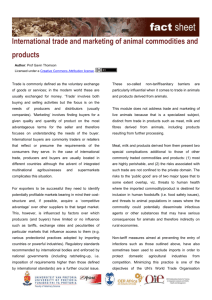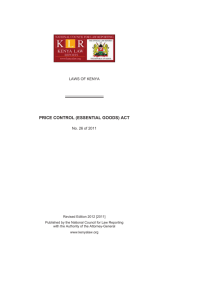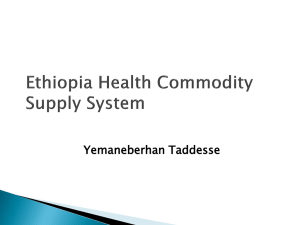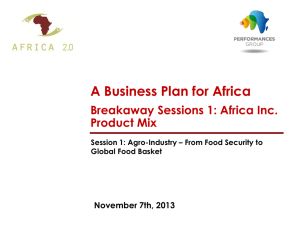Guidelines for Responsible Investing in Food Commodities
advertisement
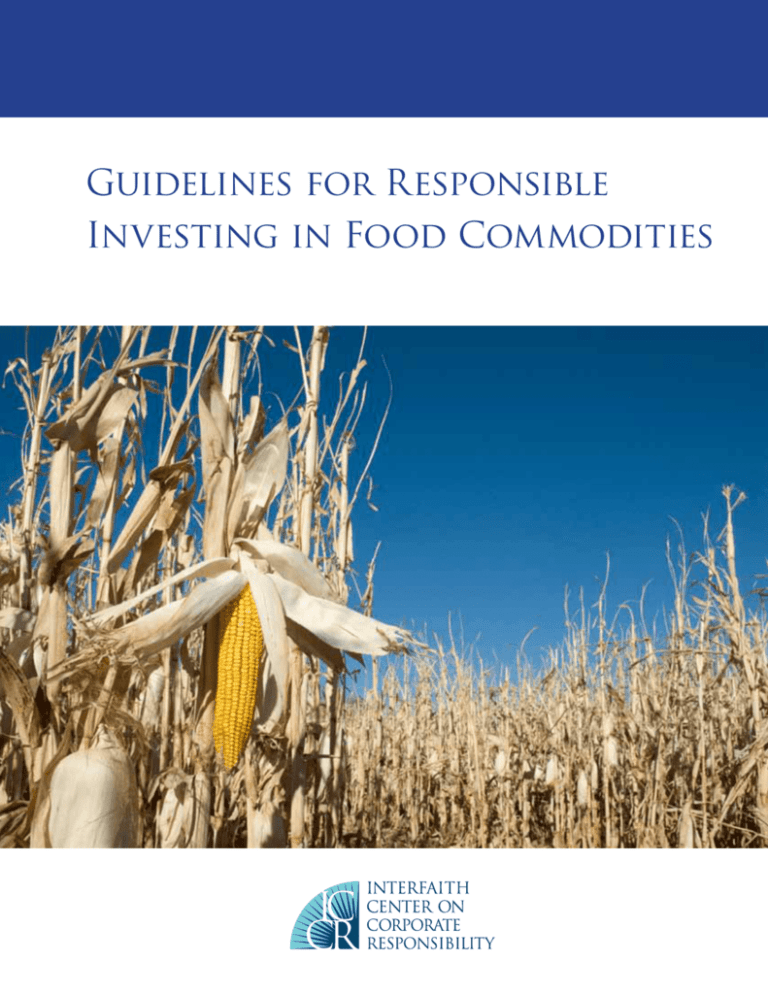
Guidelines for Responsible Investing in Food Commodities Inspired by Faith, Committed to Action Inspired by Faith, Committed to Action About these Guidelines These guidelines were developed due to a growing body of evidence that suggests a correlation between increased speculation by institutional investors and record high food commodity prices which may contribute to increased hunger and mal-nutrition in vulnerable communities aroundInspired the world. WeCommitted urge institutional by Faith, to Action investors to adopt these guidelines to ensure responsible participation in these markets. Interfaith Center on Corporate Responsibility May, 2012 Inspired by Faith, Committed to Action AB O U T I CCR Currently celebrating its 41st year, ICCR is the pioneer coalition of active shareholders who view the management of their investments as a catalyst for change. Its 300 member organizations with over $100 billion in assets have an enduring record of corporate engagement that has demonstrated influence on policies promoting justice and sustainability in the world. Photo credits: Cover: hairballusa/iStockphoto; page 4: Tatami_SkanksTatami_Skanks/iStockphoto. A significant portion of the increases in price and volatility of essential food commodities can only be explained by the emergence of a speculative bubble…a significant role was played by the entry into markets for derivatives based on food commodities of large powerful institutional investors. Olivier De Schutter, The United Nations Special Rapporteur on the Right to Food If we do nothing, we risk having food riots in the poorest countries and also an unfavourable impact on global growth. We want regulation of the financial markets for commodities. Nicholas Sarkoz y, Former President of France One of the main things in food inflation is that it has attracted speculators for short-term profit at the expense of people living a dignified life… Paul Polman, Chief Executive of Unilever Our decision is based on a number of international analyses which show a correlation between increased speculation and volatile (and record high) food commodity prices. Klaus Fridorf from Nordea, on the decision to abandon speculation in food commodities Background ICCR members are faith-based institutional investors who view the management of their investments as a catalyst for positive change while recognizing their fiduciary commitment to achieve healthy returns on behalf of their constituents. ICCR members are concerned that the potential for over-speculation or excessive hedging in food commodities markets may create global food price bubbles as these price spikes have been linked to malnutrition and famine in the world’s most economically vulnerable communities. In the search for higher returns, the participation of institutional investors in commodity markets has grown markedly in recent years while the evidence linking commodities speculation to food price volatility continues to mount.1 In recognition that “the proper functioning of agricultural markets has wide social ramifications,” Deutsche Bank recently committed to not launching any new commodities-based exchange traded products this year and in April, Deka, central institute for the German Saving Banks, committed to divest in all food commodities by the end of 2012. Additionally, there is strong evidence that the food bubbles of 2007/2008 and 2010/2011 were caused by the excessive speculation in food commodities markets spurred by both deregulation and the growing popularity of biofuels.2 In light of this evidence, we support policies that will strengthen the regulation of commodities trading (along with a reassessment of biofuel subsidies) and recommend that the following guidelines be adopted by institutional investors to ensure responsible participation in these markets. Guidelines for Commodities Investments I 3 Recommended Guidelines for Responsible Investing In Food Commodities Institutional investors who are not currently participating in the commodities markets, are encouraged not to enter this asset class. Investors who are already participating in these markets should avoid making the following new commitments: 3 Advocate for improved regulation of global commodities trading a) Support policies in the US and Europe that: • Enhance transparency in agricultural commodity derivatives markets and strengthen measures to avoid misconduct. • direct investments in food commodities and/or their derivatives; • Move OTC transactions into exchanges. In order to reduce systemic risks, all commodity transactions should pass through an exchange or clearinghouse to ensure transparency and adequate securitization. • investment in food commodity indexes and exchange traded funds (ETFs). Furthermore, we recommend investors: • Place strict limits on the entry of financial players into commodity futures markets, through position limits, etc. eliminating the “swapdealer loophole” that allows financial players to enter as “commercial” players. 1 Implement responsible policies for existing food commodities investments that acknowledge social and environmental impacts • Implement transparent and consistent policies and guidelines for investing in food commodities that respect the human right to food of local communities as articulated by the U.N. Special Raporteur, and support the Millennium Development Goal to halve the number of hungry people. • Ensure that environmental concerns are embedded as proactive elements of investment decisions, including water scarcity, impact of climate change, and decreasing availability of arable land. • If invested in the producers of commodities, engage these companies on social and environmental concerns. 2 Disclose the ESG impact of trading in food commodities • Publically disclose and report on investments in food commodities and explain the rationale of such investments, adequately addressing the right to food of local communities that may be impacted by these investments. So one question is, ‘why are coffee prices going up?’ and in addition to that, ‘why is every commodity price going up at the same time?’ And I think what’s going on is financial engineering; that financial speculators have come into the commodity markets and driven these prices up to historic levels and as a result of that the consumer is suffering. Howard Schultz, CEO of Starbucks 4 I Guidelines for Commodities Investments b) Collaborate and engage with companies in the food and finance sectors to: • Publically support greater transparency, position limits and CFTC regulations • Build public awareness of the harmful impacts of over-speculation 4 Support appropriate investments in the production of food, such as impact investing, that help mitigate the risk of famine and build sustainable communities • Seek out socially and ecologically sustainable investment opportunities. Direct capital toward financially and socially productive uses in the agricultural system that make a positive contribution to meeting long-term global objectives. • Provide working capital to smallholder farmers. Investing in farmers’ associations or co-operatives and communitysupported agriculture schemes allows direct benefits to reach poor and vulnerable communities. Institutional investors have an important role to play in ensuring the proper functioning of commodities futures markets. The ability to catalyze growth and prosperity through prudent and thoughtful investment is as real as its opposing outcome: the potential to destabilize markets leading to catastrophic famines affecting millions worldwide. ICCR urges investors to take this responsibility seriously and to consider the social impacts of their investment decisions. Notes 1. See Henn, Markus (2012) Evidence on the Negative Impact of Commodity Speculation by Academics, Analysts and Public Institutions. Retrieved 09 May 2012 from WEED: http://www2.weed-online.org/uploads/evidence_on_impact_of_commodity_speculation.pdf ; Marco Lagi, Yavni Bar-Yam, Karla Z. Bertrand and Yaneer Bar-Yam, The food crises: a quantitative model of food prices including speculators and ethanol conversion, New England Complex System Institute (2011); Ke Tang, Wei Xiong, Index Investment and Financialization of Commodities, Princeton University (2010). 2. De Schutter, Olivier (2010). Food Commodities Speculation and Food Price Crises. Retrieved 09 May 2012 from United Nations Special Rapporteur on the Right to Food: http://www.srfood.org/images/stories/pdf/otherdocuments/20102309_briefing_ note_02_en_ok.pdf Guidelines for Commodities Investments I 5
